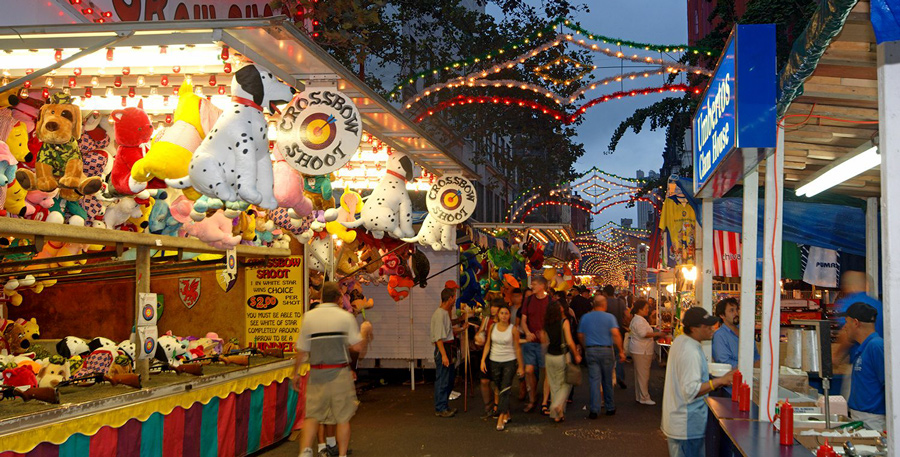How To Start Planning For A Carnival: Everything You Need To Know
Many schools, churches, cities, towns, and other organizations have generated much-needed funds by having a carnival, why?
Because they are fun! Carnivals attract plenty of local folks who have a blast experimenting with fried foods, riding the Ferris Wheel and merry-go-round and playing traditional carnival games. There’s nothing like the magic of a carnival to bring a community together to make special memories.
Those who are considering planning a carnival should know about the following essential elements that’ll help it go from “meh” to “wow!”

Required Permits
The first item carnival planners need to tackle is finding out what permits are required to host the event. Every state, city, and town has its own regulations and permit requirements. Planners should contact their local government to find out their license and permit policies. It would be such a disaster to invest lots of time and money in planning a carnival, only to have it shut down on the first day.
For example, in San Diego County, some information about permits for carnivals can be found at the San Diego County Website.
Permits you should consider and most likely will need are:
- Temporary Event Permit
- Public Event Permit
- Community Event Permit
- ABC License
- Food Vendor Operating Permit
- Temporary Food Facility Permit
- CEP Application
- Liquor License
With every element you have, it is accompanied by a permit or application; food, hiring security, fireworks, parking, portable toilets, etc. Plan your event out from every application and activity you intend on having, and start researching your city rules; some cities have stricter rules and require more permits than others.
Location, location, location!
This traditional real estate slogan rings true for carnival hosts, too. Figuring out the ideal location for the carnival is essential. Making sure it’s close enough to busy roadways but far enough for parking to be convenient and with enough open space can be rather tricky.
Thoughtfully consider all potential locations before locking down on one. In order for the carnival to be well-attended and generate a considerable amount of funds, it will need to take place in an optimal setting.
The key is finding a space that is large enough for your intended guest list, plus games, rides, and vendors. Most carnivals take place in dusty fields, outside the town, with parking being as big if not bigger than the venue itself.
Figuring out the who’s who of the carnival
A carnival will only run smoothly with the right people in place.
Thoughtfully consider which positions are needed for the carnival to operate smoothly. Selectively choose staff, volunteers, and carnival attendees based on specific criteria and needs. Successfully hiring people with a hard-working, team-motivated mindset and effective communication skills will allow the carnival to progress smoothly every minute it’s open.
When looking for volunteers, find a ticketing software that incorporates volunteer sign-up solutions. For example, Purplepass allows event promoters to create separate events/portals where volunteers can directly sign up for preferred positions, check-in, access safety materials and rule books, etc. It also acts as a central hub for communication amongst management and their team.
These are the questions you should ask yourself before seeking volunteers and staff:
- How many volunteers do we need per area?
- Do we want to have extra volunteers on stand-by?
- What are the different shifts and time we need our volunteers for?
- How are we going to reach out to find volunteers?
- Are we offering incentives for anyone that volunteers, such as a free day pass or food voucher?
Positions needed at carnivals include:
- Setup and tear down crew
- Concession workers
- Admissions/gate entry
- Merchandise stands
- Booths - games and prizes
- First Aid Booth
- Floaters (fill in where needed)
- Parking Directors
- Security
- Publicity Support (marketing teams)
- Ride Management
- Janitors (for throughout the event)
- Information Booth/Directory
Carnival Attractions
Everyone has their favorite carnival rides - the ones that bring a look of nostalgia to their eyes or perhaps gets their adrenaline really pumping.
Depending on how big or small a carnival planning committee’s budget and priorities may be, there are a wide range of options in terms of attractions and what to include at your typical carnival:
- Merry Go Round
- Haunted House
- Ferris Wheel
- Cliff Hanger
- Free Fall
- Scrambler
- Bumper Cars
- Tilt-a-Whirl
- Zero Gravity
- And many more!
Everyone has their own preferences, so including a variety of ride options ensures everyone leaves the
carnival, satisfied and happy.
Other activities that are popular for lower budget carnivals:
Face Painting- Sand Art
- Photo Booths
- Ring Toss
- Balloon Art
- Big Games Pieces (large Chess or Janga)
Spice up the carnival with game rentals
For a carnival with genuine pizzazz, renting some carnival games, concession food machines, and perhaps even a bouncy house can be a wise investment. Renting these items is often a cost-effective way to make a carnival garner plenty of attention and attract as many guests as possible.
There are numerous of rental companies out there with options for anything you might want. Anything from dunk tanks, inflatable structures to giant slides and simulators. The more creative you get, the better.
Finding Sponsors
Garnering sponsorships for the carnival is a smart way to reduce costs. Seeking companies to sponsor your carnival often requires plenty of legwork, but carnival planners have found that the investment of time and effort pays off.
Not sure how to get a company to sponsor the carnival?
Often, it can be as easy as simply stopping by a local business in-person, sending off a quick email or LinkedIn message, or networking with other people in the carnival planning organization to find connections to local businesses. Many have found that reaching out to new local businesses for sponsorship opportunities is fruitful because they could use the publicity.
A few local businesses to reach out to might include:
- dental offices
- banks
- car washes
- real estate offices
- insurance salespeople
- local restaurants
- SponsorMyEvent
Many carnival organizers have found that offering various levels of sponsorship packages has been helpful, so people have options about how much they would like to contribute and get in return. A concise, spirited explanation of how the funds generated from the carnival will be used is an important element of any sponsorship ask.
Check out this article on how you can persuade companies to sponsor your event.
Don't Forget About Marketing
Amongst all the necessary, required activities that go toward planning a carnival, one that is too-often overlooked is marketing. If no one knows about the carnival, no one will come! So make sure you have a team in charge of marketing the event.
There are thousands upon thousands of ways to market events, you can learn more strategies at the Purplepass Blog or subscribe below for weekly tips and blog posts.







